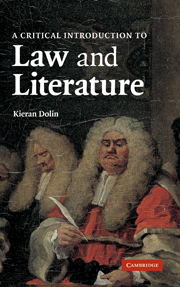Book contents
- Frontmatter
- Contents
- Preface
- Introduction to law and literature: walking the boundary with Robert Frost and the Supreme Court
- PART I EMINENT DOMAINS: THE TEXT OF THE LAW AND THE LAW OF THE TEXT
- PART II LAW AND LITERATURE IN HISTORY
- 3 Renaissance humanism and the new culture of contract
- 4 Crime and punishment in the eighteenth century
- 5 The woman question in Victorian England
- 6 The common law and the ache of modernism
- 7 Rumpole in Africa: law and literature in post-colonial society
- 8 Race and representation in contemporary America
- Conclusion
- Notes
- Bibliography
- Index
3 - Renaissance humanism and the new culture of contract
Published online by Cambridge University Press: 05 June 2012
- Frontmatter
- Contents
- Preface
- Introduction to law and literature: walking the boundary with Robert Frost and the Supreme Court
- PART I EMINENT DOMAINS: THE TEXT OF THE LAW AND THE LAW OF THE TEXT
- PART II LAW AND LITERATURE IN HISTORY
- 3 Renaissance humanism and the new culture of contract
- 4 Crime and punishment in the eighteenth century
- 5 The woman question in Victorian England
- 6 The common law and the ache of modernism
- 7 Rumpole in Africa: law and literature in post-colonial society
- 8 Race and representation in contemporary America
- Conclusion
- Notes
- Bibliography
- Index
Summary
Francis Bacon, in The Advancement of Learning, divided history into ancient, medieval and modern periods, proclaiming, ‘this third period of time will far surpass that of the Graecian and Roman learning’. Bracketing off the medieval centuries as unworthy of notice, he and his contemporaries turned instead to ancient Greece and Rome as their true humanistic precursors. Characterising their own culture as a ‘renaissance’ or rebirth of classical learning, they believed that the study of Greek and Roman texts afforded a unique instruction in the acquisition of a fully rounded humanity. Shakespeare's Hamlet recognises, though in his despondency he cannot share, the optimism and idealism implicit in this humanism: ‘What a piece of work is man! How noble in reason! how infinite in faculties! in form and moving, how express and admirable! in action how like an angel! in apprehension, how like a god!’ The moral values and rhetorical skills modelled in this educational programme were directed both inwardly, at the private cultivation of the individual, and outwardly, at effective participation in government as a counsellor or courtier.
In the field of literary studies, it is traditional to emphasise the cultural achievements of the age, to view works like Hamlet as ‘only the most succulent of the fruits [grown] from deep roots in the training the humanists offered’. However, more recent scholars have been concerned not merely to appreciate the flavours of such fruit, but to study its connections with the branches, roots and soil of Renaissance society and culture.
- Type
- Chapter
- Information
- A Critical Introduction to Law and Literature , pp. 75 - 95Publisher: Cambridge University PressPrint publication year: 2007



